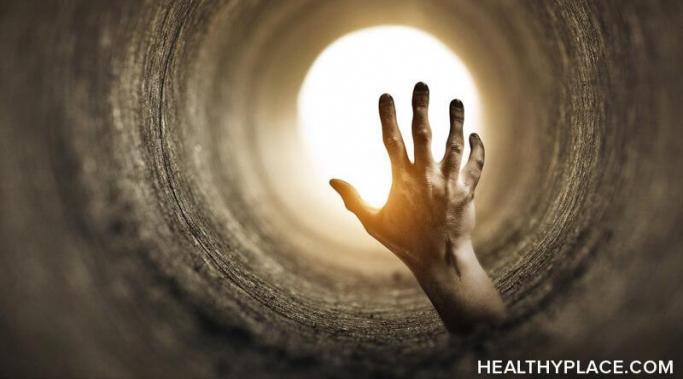Blogs
Lying about depression is common when you're seriously depressed. This isn't so much on purpose; it's just what happens. People tend to not want to hear about depression, and to bend to their will, we lie about it. When seriously depressed, we often lie when we laugh, lie when we share what's happening in our lives and even lie when we smile. But is every smile a depression lie? Is lying about depression bad?
Today I want to talk about why it's so difficult to follow through on New Year's resolutions when you have posttraumatic stress disorder (PTSD).
The relationships that I form with my personal training and online coaching clients are important, but they're also complicated. As a fitness professional, I fancy myself a peddler of good health. But in truth, the fitness industry is fraught with side effects and unintended consequences. Many of us use social media as a way to advertise our services. But as we label the photos we post of our abs as "fitness inspiration," many of us are willfully ignoring the fact that photos like these often make women feel worse, not better, and are perhaps contributing to body dissatisfaction and diminished self-esteem. Furthermore, in our efforts to help clients reach their fitness goals, we often find ourselves giving nutrition advice, which is outside of our scope of practice. Our clients trust us, and we want to form strong relationships with our clients. At the same time, it's important for us to keep in mind the complicated dynamics that go along with food -- and it's imperative that we don't matriculate our clients and followers into obsessive behaviors and disordered eating.
New Year's resolutions are tricky for everyone, but they can be particularly troublesome for those of us recovering from mental illness. How do you set goals that will push you but won't push you over the edge? Is it possible to make resolutions that you can still accomplish even if it turns out to be a bad year for your mental health? Do you have enough faith in yourself to even set any goals this year? It's hard to know the answers to these questions, which begs another question: are New Year's resolutions a good idea for people with mental illness? I think they absolutely can be, it just depends on each individual person and their situation.
Never tell a person with depression to lighten up. Take my advice here, and just don't do it. There is an infinite number of things to say to a person with depression that is appropriate, but telling a person with depression to "lighten up" is not one of them.
Overcoming mental health stigma is not something I would have thought possible. It's such a pervasive and negative force that it can seem insurmountable. Yet, upon reflection, I know it's not affecting me like it once did.
The first month of the new year can stir up different thoughts and emotions for everyone. Some people will feel really excited and confident about the new year. Others might have reservations about the new year or simply not care. No matter how you feel right now, it is very important to focus on mental health during the month of January. To learn about the importance of mental health and ways to work on it in January, read this article.
I woke up to the sound of the phone ringing. This wasn’t unusual—the medication I take for my schizoaffective disorder makes me sleep late. But the call I was about to take would prove to be very unusual. (Note: This post contains a frank discussion of suicidal thoughts.)
If you were to ask most people what someone with depression looks like or how someone who has depression might behave, they would likely respond by saying things like, "sad," "crying," "miserable," or "gloomy." While those of us with depression feel these emotions and exhibit these behaviors at times, they certainly don't encompass all that we are. People with depression feel many things over the course of their lives, and it's time to end the stigma and remove the stereotypes associated with depression.
Dating can be hard for everyone, and signs of unhealthy relationships can be difficult to spot. Here are some early tell-tale signs that the relationship is unhealthy--also known as "It's complicated."










I believe she will only be able to rid herself of her demons, and hopefully her BPD as well, when she's ready to confront the abuse of her father. If she can put the blame where it belongs, she may stop projecting that victim/perpetrator cycle on the present men in her life. These demons are a metaphor for the purgatory she has created for herself. That reality has consequences in the real world, but it need not be real in the tangible sense. Exorcising her demons will require the expenditure of real physical energy and probably the destruction of aspects of her personality. If this ever happens, and it's possible but not probable, then these demons will evaporate. They are only as real as one's personality is real. In short, reality is not the question, it's what you make of the things you feel to be real.